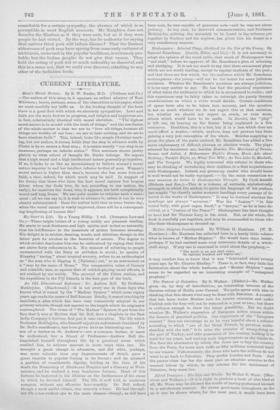CURRENT LITERATURE.
Man's Mora/ Nature. By R. W. Backe, M.D. (Trtibner and Co.) —The author of this essay is, it appears, an ardent admirer of Walt Whitman ; hence, perhaps, some of the obscurities in his pages, which we must candidly say bailie ns. In the loading thought of the book there is a good deal with which wo sincerely sympathise. Love and faith are the main factors in progress, and religion and happiness are, in fact, substantially identical with moral elevation. " The highest moral nature is in accord with the truth of things," and the conclusion of the whole matter is that we are to "love all things, because all things are worthy of our love ; we are to hate nothing, and we are to have absolute faith." This, indeed, looks like simple Christian teach- ing, but our author, it seems, holds that the step in advance made by Christ is by no means a final step ; it is rather merely one step iu an immense, perhaps an infinite series." This sentence shows pretty plainly to what school of thought Dr. Backe belongs. Ha argues that a high moral and a high intellectual nature generally go together. If so, it looks to us like an inconsistency to believe woman's moral nature superior to and her intellect inferior to that of man. Woman's moral nature is higher than man's, because she has more love and faith, a view, indeed, for which much may be said. In support of his theory that those who have the best moral natures live longest (those whom the Gods love, do not, according to our author, die early), he mentions the Jews, who, it appears, are both exceptionally moral and long livers, We are quite unable to criticise snoh a state- ment ; all wo can say is, it is rash to advance it, unless it can be very clearly substantiated. Does the author hold that at some future day, when the moral nature is vastly improved, there will be a correspond- ing lengthening of human life


































 Previous page
Previous page